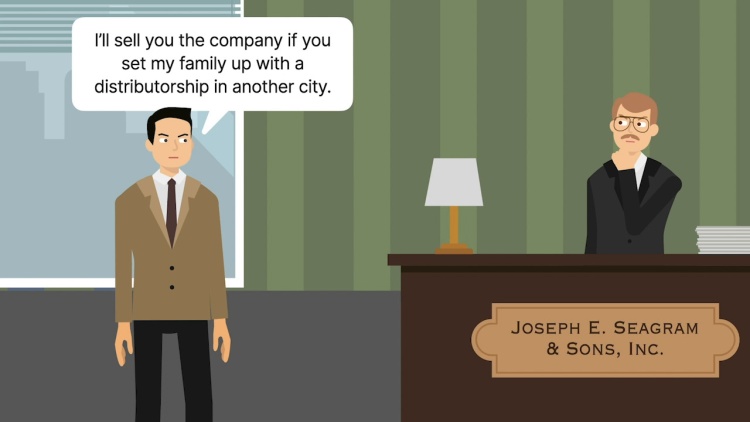Lee v. Joseph E. Seagram & Sons, Inc.
United States Court of Appeals for the Second Circuit
552 F.2d 447 (1977)
- Written by Megan Petersen, JD
Facts
Harold Lee and his sons Lester and Eric (plaintiffs) owned a 50 percent interest in Capitol City Liquor Company (Capitol City), a wholesale liquor distributor that sold a significant amount of Joseph E. Seagram & Sons, Inc. (Seagram) (defendant) products. Harold’s brother and nephew owned the other 50 percent. The owners desired to sell the business, and in May 1970, Harold approached Jack Yogman, an executive of Seagram, to discuss a sale. Harold had known Yogman for 13 years and had supported Seagram for 36 years prior to his ownership of Capitol City. Harold offered to sell Capitol City to Seagram on the condition that Seagram relocate Harold and his sons in a new distributorship. Approximately one month later, the owners of Capitol City met with John Barth, an assistant of Yogman, and began negotiations for the sale of Capitol City. A written agreement for the sale was finalized in September 1970. No new distributorship was secured for the Lees. They filed suit against Seagram in January 1972, alleging that Seagram had breached the oral agreement formed by Harold and Yogman. The trial judge denied Seagram’s motion for summary judgment, concluding that the parol-evidence rule would not preclude evidence of the oral agreement because it was unclear whether the oral agreement was meant to be integrated into the written contract. The written contract contained no integration clause. At trial, Seagram did not present evidence regarding integration. The jury found in favor of the Lees, and the court denied Seagram’s posttrial motions. Seagram appealed.
Rule of Law
Issue
Holding and Reasoning (Gurfein, J.)
What to do next…
Here's why 907,000 law students have relied on our case briefs:
- Written by law professors and practitioners, not other law students. 47,100 briefs, keyed to 996 casebooks. Top-notch customer support.
- The right amount of information, includes the facts, issues, rule of law, holding and reasoning, and any concurrences and dissents.
- Access in your classes, works on your mobile and tablet. Massive library of related video lessons and high quality multiple-choice questions.
- Easy to use, uniform format for every case brief. Written in plain English, not in legalese. Our briefs summarize and simplify; they don’t just repeat the court’s language.





